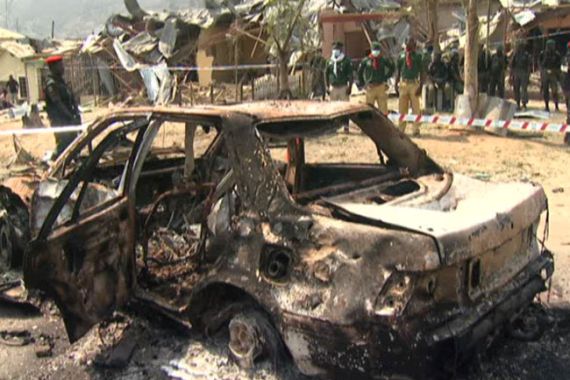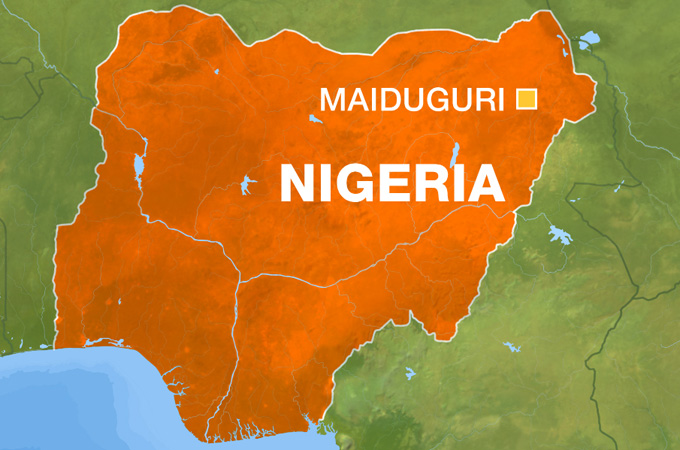Boko Haram blasts continue in Nigeria
Boko Haram claims responsibility for three blasts in Maiduguri and Damaturu, cities under a state of emergency.

 |
Three bomb blasts have hit the northern Nigerian cities of Maiduguri and Damaturu, just days after the areas were placed under a state of emergency, the military and witnesses say.
No casualties were immediately reported after the attacks on Wednesday, claimed by the armed Islamist group Boko Haram following an alleged ultimatum it had set.
Abul Qaqa, who claims to be a spokesman for Boko Haram, said the group was behind the Damaturu and Maiduguri bomb attacks. His claims could not, however, be independently verified.
“We are responsible for the bomb blasts in Damaturu and Maiduguri this evening,” he said in a phone call made to the AFP news agency.
“This is a response to the expiration of the ultimatum we gave to southerners to leave.”
The purported spokesman on Sunday gave southerners living in the north three days to leave the region in the wake of Jonathan’s state-of-emergency decree.
He warned that the group would confront soldiers and threatened Christians living in the country’s north.
State of emergency
The attacks were the first incidents in the area since President Goodluck Jonathan declared a state of emergency last weekend in parts of the country hard hit by Boko Haram.
Fears have risen that Boko Haram, whose name means “Western education is forbidden”, and whose movement is styled on the Taliban, is trying to ignite sectarian strife in Nigeria, Africa’s top oil producer.
Lieutenant-Colonel Hassan Mohammed, the spokesman for a special military taskforce in Maiduguri, told AFP on Wednesday: “There were two explosions in the Mairi area… this evening. The explosives were planted in a ditch and detonated when nobody was around.”
|
|
In Damaturu a bomb went off at a popular open-air drinking spot where a locally-brewed gin is normally served in Kandahar, according to a regular patron.
“There was a loud bang … which raised dust all over the place. This was followed by pandemonium as everybody took to their heels,” Henry Samuel said by phone from Damaturu.
In a first attack since the state of emergency was declared, but outside the areas covered by the decree, gunmen attacked a police station in northern Nigeria’s Jigawa state, killing a teenage girl and wounding an officer late
Tuesday.
“The gunmen shot indiscriminately into the police station and engaged our men in a shootout, killing a teenage girl trying to flee and wounding a policeman,” Hashimu Argungu, the Jigawa state police commissioner, said.
He said an explosive thrown into the police station failed to detonate.
No one claimed responsibility for the attack, but Boko Haram is suspected to be behind it.
A Damaturu hospital source said bodies of two civilians shot in a separate incident also were brought in from an area on the outskirts of the city. It was not clear who shot them or why.
Sectarian violence
Jonathan’s weekend declaration of a state of emergency in parts of four northern states hard hit by attacks blamed on Boko Haram, was in response to a wave of attacks attributed to the group.
While Boko Haram has been staging increasingly deadly attacks for months, including an August suicide bombing of UN headquarters in Abuja that left 25 dead, the Christmas bombings that killed 49 people as services ended at a
Catholic church sparked intense fear and outrage.
|
“This is a response to the expiration of the ultimatum we gave to southerners to leave“ – Abul Qaqa, alleged Boko Haram spokesman |
Nigerian authorities said they did not believe militants would follow through on the ultimatum, but added that they were taking no chances.
Muslims have frequently been victims of Boko Haram attacks, most of which have occurred in northeastern Nigeria.
However, the Christmas Day bombings particularly targeting churches set off fears of retaliation from Christians.
On Friday, three seemingly counter-attacks took place in Maiduguri shortly after Muslim Friday prayers.
Nigeria, Africa’s largest oil producer and most populous nation with 160 million people, is roughly divided between a mainly Muslim north and predominantly Christian south.
Followers of the two faiths however co-exist with millions of Muslims based in the south and millions of Christians in the north.
Also in Nigeria, strikes and demonstrations taking place across the country and leading up to mass action planned by trade unions for Monday, January 9, in response to a government decision to scrap a fuel subsidy at the start of the week, has claimed one life and injured many more.